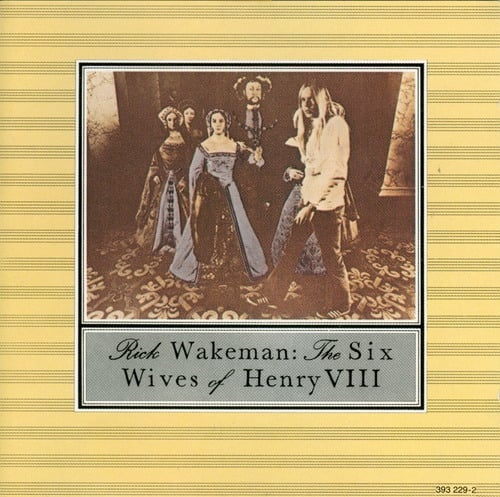
|
THE SIX WIVES OF HENRY VIIIRick WakemanSymphonic Prog4.13 | 940 ratings |
From Progarchives.com, the ultimate progressive rock music website
| Landaughost like |
 There are two kinds of composers, those who compose music to be auditioned and
those who compose music to be studied! From its very opening bars the "Six Wives of
Henry VIII" naturally invites attention to this distinction. The formidable compositional
challenge which essentially defines "Progressive Rock" amounts - in my personal
opinion - to the task of synthesizing essentially incongruous, if not conflicting, forms of
musical expression. The fusion of popular music culture, prominently that of rock and
jazz music, with the harmonic scales of western European music and the earlier twelve
modes of 16th century "Renaissance" music is a task which necessitates knowledge of
the limitations relevant to the harmonic possibilities of the former, deep understanding
of the latter and substantial imagination.
There are two kinds of composers, those who compose music to be auditioned and
those who compose music to be studied! From its very opening bars the "Six Wives of
Henry VIII" naturally invites attention to this distinction. The formidable compositional
challenge which essentially defines "Progressive Rock" amounts - in my personal
opinion - to the task of synthesizing essentially incongruous, if not conflicting, forms of
musical expression. The fusion of popular music culture, prominently that of rock and
jazz music, with the harmonic scales of western European music and the earlier twelve
modes of 16th century "Renaissance" music is a task which necessitates knowledge of
the limitations relevant to the harmonic possibilities of the former, deep understanding
of the latter and substantial imagination. Hardly have these qualities ever come together so forcibly and brilliantly but in the "Six Wives of Henry VIII". Not only is the "Six Wives" a landmark and definitive work of Progressive Rock but - in my opinion - also a remarkable moment in twentieth century music, a work as progressive in its contribution to the development of new directions as it is artistic in its high aesthetic appeal. From the galloping crescendo on the percussion which announces the first imposing chords in "Catherine of Aragon" to the dazzling choral section in the concluding "Catherine Parr" the "Six Wives" confidently alternates between so many diverse kinds of musical expression without ever being contrived, pompous or thematically inconsistent. It is a work of musical rigor yet, far from being cerebral, it achieves a depth in its range of emotional expression which balances the logic underlying the development of musical ideas in it. Fast-paced Jazz sections give way to Baroque music, the Blues music is exquisitely tinged with references to the Renaissance element, Renaissance music foreshadows Jazz and hard-Rock sections eventuate in references to Renaissance music. The melodic line is highly embellished with "little notes" - mostly delivered on the piano - and exciting in its unpredictable development. Snipped improvisations are constantly interpolated between the advanced harmonic structures. The rhythm is malleable and constantly changes according to the demands of the thematic development. The thematic development, itself, consists mostly in imaginative successions of thematic units which consistently preserve the unity of key. The mood follows the adventures of the thematic development and constantly changes as the melodic line advances in a multiplicity of musical idioms, as sections of wistful serenity are punctuated by unsettling cadenzas of sheer rhetorical violence to generate dramatic effects remotely reminiscent of Beethoven's great late piano sonatas, as the thematic development of dark and introspective Renaissance sections eventuates in elevated Blues music with its exquisite melancholy substantially heightened by the vocal lines delivered by the female chorus, as old American Ragtime exuberance gives way to a transient reference to Bizet's opera "Carmen", as an underlying sense of humor surges forth every time such unexpected transient references to classical themes, interspersed throughout the entire work, appear. (It really stands to reason how contemporary English composer John Rutter reacted to the exquisite and dream-like section which concludes the "Anne Boleyn")*. The witty and intriguing title of that work suggests a romantic outlook on that period of English history which is the central reference of the musical composition. The composition itself is highly technical, placing constant demands on the performer and Rick Wakeman delivers an outstanding performance of his own music. By dint of the vanguard character of the music and of the sheer brilliance which characterizes both the composition and the performance Rick Wakeman set a challenge with his "Six Wives of Henry VIII" which only exceptionally few composers in Progressive Rock managed to meet. ------------------ * That section is based on a theme from one of John Rutter's choral works.
Landaughost |
5/5 |
MEMBERS LOGIN ZONEAs a registered member (register here if not), you can post rating/reviews (& edit later), comments reviews and submit new albums. You are not logged, please complete authentication before continuing (use forum credentials). Social review commentsReview related links |

 |
| 